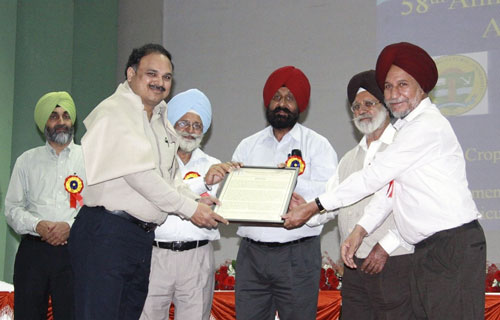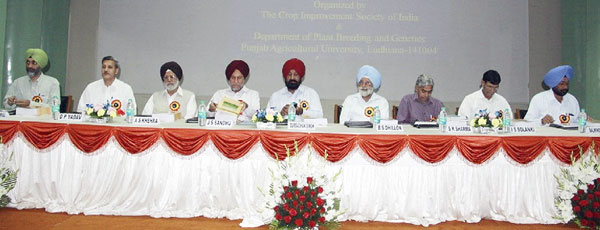The 58th All India Coordinated Annual Maize Workshop was held at Punjab Agricultural University (PAU) in Ludhiana, India during 4-6 April. The workshop brought together nearly 200 scientists in India working on maize research and development, as well as representatives from seed companies. The All India Coordinated Research Project (AICRP) on Maize was the first crop research project established in India in 1957 and served as a model for all following crop projects in the country.

“We need to double maize production and productivity in India through multi-institutional, multi-pronged strategies,” said B.M. Prasanna, director of CIMMYT’s global maize program, during the workshop’s keynote lecture. He went on to explain how “this can be achieved through germplasm enhancement, broadening the phenotyping scale and precision and accelerating breeding through doubled haploid technology, among other improved technologies and management practices.”
“The partnership between the Indian Council of Agricultural Research (ICAR) and CIMMYT over the last several decades has benefited the Indian breeding program immensely, from providing germplasm to receiving support for human resource development,” said O.P. Yadav, Director of the Indian Institute of Maize Research (IIMR). Yadav presented AICRP-Maize’s 2014 achievements, such as the release of 17 new varieties and national maize production reaching its highest level (24 million tons).
A panel discussion co-chaired by Prasanna and J.S. Sandhu, Deputy Director General-Crop Science at ICAR, entitled “Doubling maize production in India by 2025: Opportunities and Challenges” drew representatives from several public and private institutions working on maize. Prasanna and A.S. Khehra, former PAU Vice-Chancellor, were congratulated for their outstanding achievements in maize research, including the release of several improved maize varieties and advances in genetics and molecular breeding.

“Genetic gains must also translate to yield gains in farmers’ fields,” Prasanna declared. “We must effectively integrate improved varieties that meet the needs of farming communities with sustainable intensification practices.”
The workshop closed with an overview of achievements and finalization of a 2015 work plan, with scientists from AICRP-Maize Centres and CIMMYT providing input. Also in attendance were Gurbachan Singh, Chairman of India’s Agricultural Service Recruitment Board; BS Dhillon, Vice-Chancellor of PAU; SK Sharma, Chairman of IIMR’s Research and Advisory Committee; IS Solanki, Assistant Director of ICAR’s General-Food Crops; and S.K. Vasal, retired CIMMYT Distinguished Scientist.
 Capacity development
Capacity development